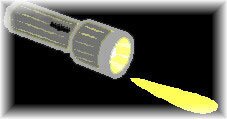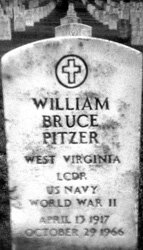 Dark Corners Menu |
 Pitzer Main Page |
 Dark Corners Menu |
 Pitzer Main Page |
This article will make sense only if
The Case for Homicide and
The Case for Homicide Reconsidered are
read first.
![]()
by Allan Eaglesham
|
Two of his navy colleagues told me that William Pitzer would have been the last man they would have expected to commit suicide. Although broadly held, this view was not monolithic. For example, a family member detected a chink in the armor. An FBI report of an interview at the Pitzer residence on the day after the death states:
[redacted] could not specifically recall the remarks [redacted] to indicate this trend of thought, but stated that [redacted] would not be surprised if the death were ruled a suicide. An FBI report of an interview with a neighbor of the Pitzers includes the following: She recalled that Mr. PITZER had been extremely upset several years ago when [line redacted] reportedly changed his attitude. [Redacted] had no other information concerning any periods of depression on the part of PITZER. |
 RIP Arlington National Cemetery |
|
And a report of an interview with another naval colleague includes:
PITZER was a perfect image of a Naval Officer and a perfectionist. During the past six months or seven months, PITZER appeared to be on edge and became very irascible when the slightest thing went wrong. Mrs. Pitzer told investigators that her husband had been "mildly despondent" on the day before he died: She commented that Subject had attended the funerals of two close friends on the preceding Monday and Friday and after the second he had seemed mildly despondent for a time. She recalled that Subject made a remark such as "That's two this week. I wonder who the third will be," and surprisingly expressed a preference for a military funeral. Harold Rydberg is of the opinion that William Pitzer was the kind to suffer from "military syndrome" -- with which goes a fear of loss of identity on retirement [12]: I will always miss him and all he inspired in others. His greatest accomplishments were to come up through the ranks and be an inspiration to other enlisted men and women. It was his greatest pleasure to help others. The loss of that still keeps me on military syndrome, the loss of identity. To you and [me] this might not have been a reason, but that was his whole life: the military. If "military syndrome" was a contributory factor, it begs the question of what would have made LCDR Pitzer take the final step on the afternoon of October 29, 1966, when he was at least three months from retirement. Two eyewitnesses saw him in his dress-blue uniform that afternoon; did he attend an important meeting at the NNMC that had an acutely depressing effect on him? Mrs. Pitzer said that he -- an inveterate note-maker -- would have, for certain, left a written explanation. Although a notepad and pencil were found on a chair within arm's reach of where he was sitting when he apparently took his life, there is no evidence that he left a suicide note. On the other hand, he apparently wrote a brief letter approximately 75 minutes before he died, to a woman with whom he had recently spent time during a business trip to Pensacola. Although other documentary items of evidence in the FBI file are Xerox copies of originals, this letter is provided in retyped form as part of a report of an interview with the woman in question: Saturday afternoon [Redacted] Some aspects of this strange note are consistent with contemplation of death, and some are not. Within a few minutes of writing it, LCDR Pitzer was seen in his car, presumably taking it to the post office for mailing, after which he returned to the television studio. If he had not been contemplating suicide, it seems likely that he would have planned to mail it on his way home that evening. In a recently published book on the Pitzer case [13], author Kent Heiner made this important statement: If [Dennis] David had not been mistaken about which hand was Pitzer's dominant hand, he may not have mentioned his late friend to any reporter or researcher; few outside Pitzer's family and acquaintances would know his name or his story. When forensic expert Herbert MacDonell opined that the death-scene photograph shows a bullet wound in the left temple, I felt certain that William Pitzer had been murdered. However, my meeting with SA DiPaola, viewing of the autopsy photographs, and reconsideration of the available information, have brought me to the belief that the gunshot wound was self-inflicted. In my opinion, there is no physical evidence indicative of homicide, just as there is no evidence that LCDR Pitzer was in possession of a movie film of the Kennedy autopsy beyond a few days after the Kennedy assassination. Notes |
|
 Dark Corners Menu |
 Pitzer Main Page |
![]()